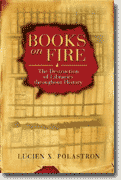Books on Fire
Lucien X. Polastron
book reviews:
· general fiction
· chick lit/romance
· sci-fi/fantasy
· graphic novels
· nonfiction
· audio books
· author interviews
· children's books @
curledupkids.com
· DVD reviews @
curledupdvd.com
newsletter
win books
buy online
links
home
for authors
& publishers
for reviewers

 |
Books on Fire: The Destruction of Libraries throughout History Lucien X. Polastron Inner Traditions Hardcover 384 pages August 2007 |
|
Author Lucien X. Polastron depicts the worst nightmares of bibliophiles in his erudite and always captivating look at Books on Fire: The Destruction of Libraries throughout History
No record of the burning of libraries would be complete without a mention of perhaps the most famous library of them all, the Great Library at Alexandria, Egypt. That is, of course, mentioned here, along with the various opinions of what caused the horrendous fire there. The theory most people hold is that the fire was caused by Caesar, but Another notion is that almost all the books survived the battle of Alexandria only to be later destroyed during the various and quite violent events that followed.Though the destruction of the Great Library was a devastating loss of knowledge and books to the world, it was far from the only one. Polastron relates many, many others that occurred both before and after the death of the Great Library. For instance, there were so many fires that destroyed libraries in Rome that, according to the author, “A Roman — if he survived — had the chance of seeing a good half-dozen fires over the course of a lifetime.” Then there were books and libraries destroyed in the name of the world’s various religions. No religion is blameless; Muslims, Jews, and Christians all had major and unfortunate roles to play in the devastation and destruction of libraries. Even Paul from the Bible played a part in this miserable state of affairs that has plagued mankind: In Ephesus, Paul managed to convince many of those he converted “to bring books so they could be put together and set on fire in view of all; he evaluated them and found them worth fifty thousand silver denarii.”How to explain the horror that a bibliophile feels upon reading Books on Fire Part of the joy of reading Books on Fire I mentioned Appendix 3 earlier; Appendix 1, “The Great Writers Are Unanimous: Delenda Est Bibliotheca! (The library must be destroyed)” depicting as it does attitudes of writers who seem to be in favor of the destruction of books and libraries, is another example. The perverseness of being a writer of books who either favors book burning or writes about some characters who do so is somewhat difficult to understand. Authors make their fame and fortunes from writing books; what could possibly cause them to think it would be a good thing to destroy books? A book on the subject of books - not only about books, but about the burning of books and libraries - might give the impression of being dull and boring. That is far from the case with Books on Fire Originally published on Curled Up With A Good Book at www.curledup.com. © Douglas R. Cobb, 2007 |
|
|
|
 Click here to learn more about this month's sponsor! |
|
| fiction · sf/f · comic books · nonfiction · audio newsletter · free book contest · buy books online review index · links · · authors & publishers reviewers |
|
| site by ELBO Computing Resources, Inc. | |
 Polastron traces the history of this subject in an informative way, never reducing or limiting the importance of the loss of so much knowledge merely to dates and numbers of volumes lost, as a less talented author might. Instead, he makes the tale of the losses palpable and engrossing by writing about the people behind the construction of various libraries, the people who owned private collections and libraries, and the people behind the demise of them, putting faces to the accounts he relates.
Polastron traces the history of this subject in an informative way, never reducing or limiting the importance of the loss of so much knowledge merely to dates and numbers of volumes lost, as a less talented author might. Instead, he makes the tale of the losses palpable and engrossing by writing about the people behind the construction of various libraries, the people who owned private collections and libraries, and the people behind the demise of them, putting faces to the accounts he relates.